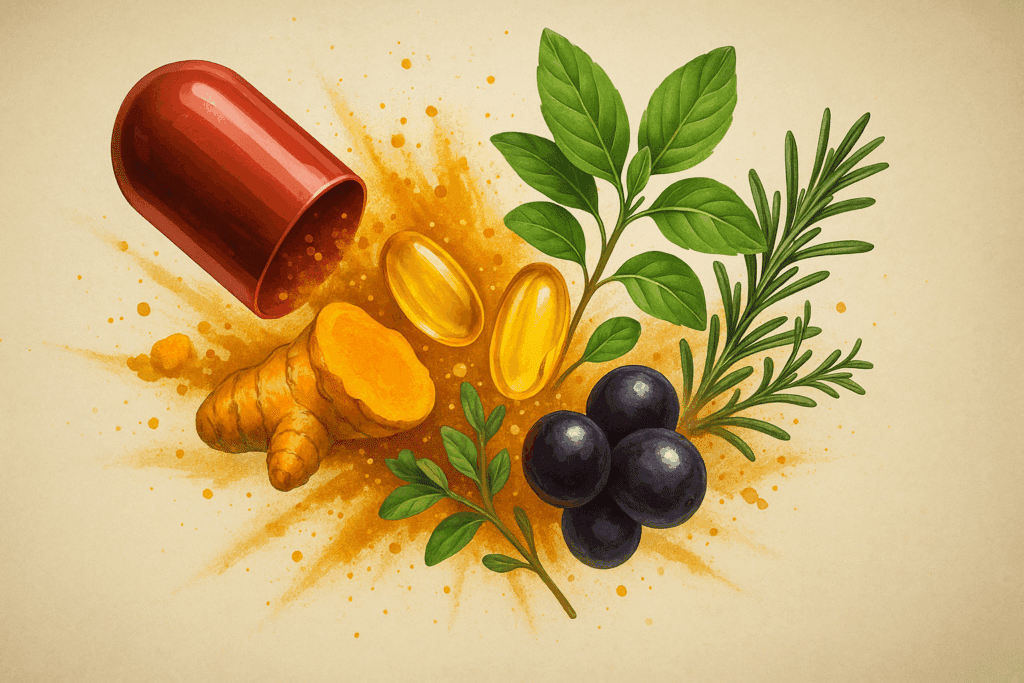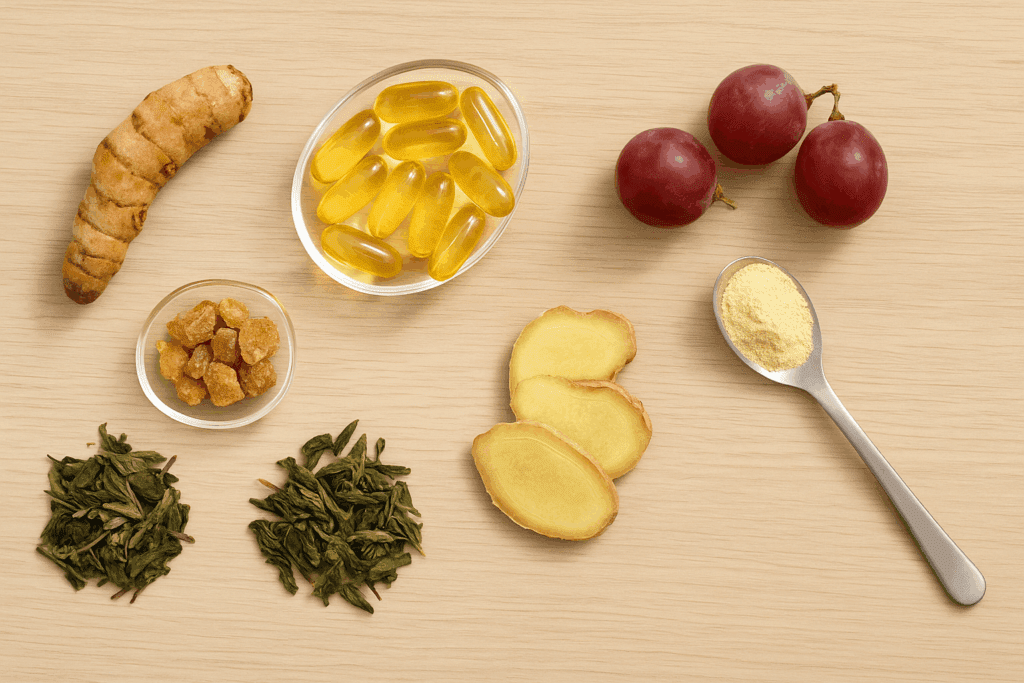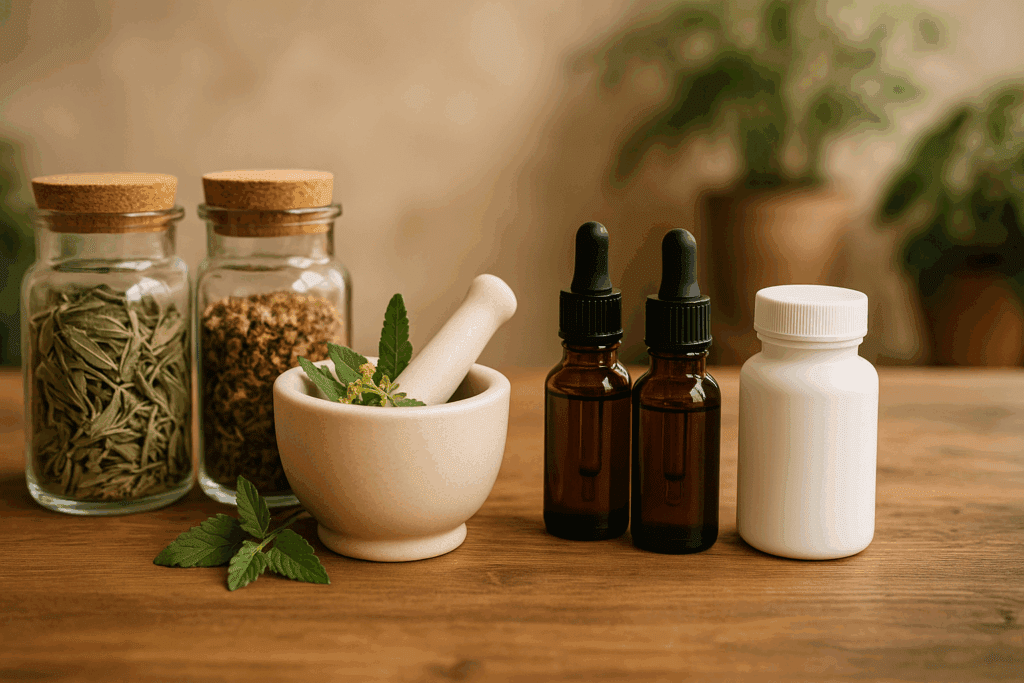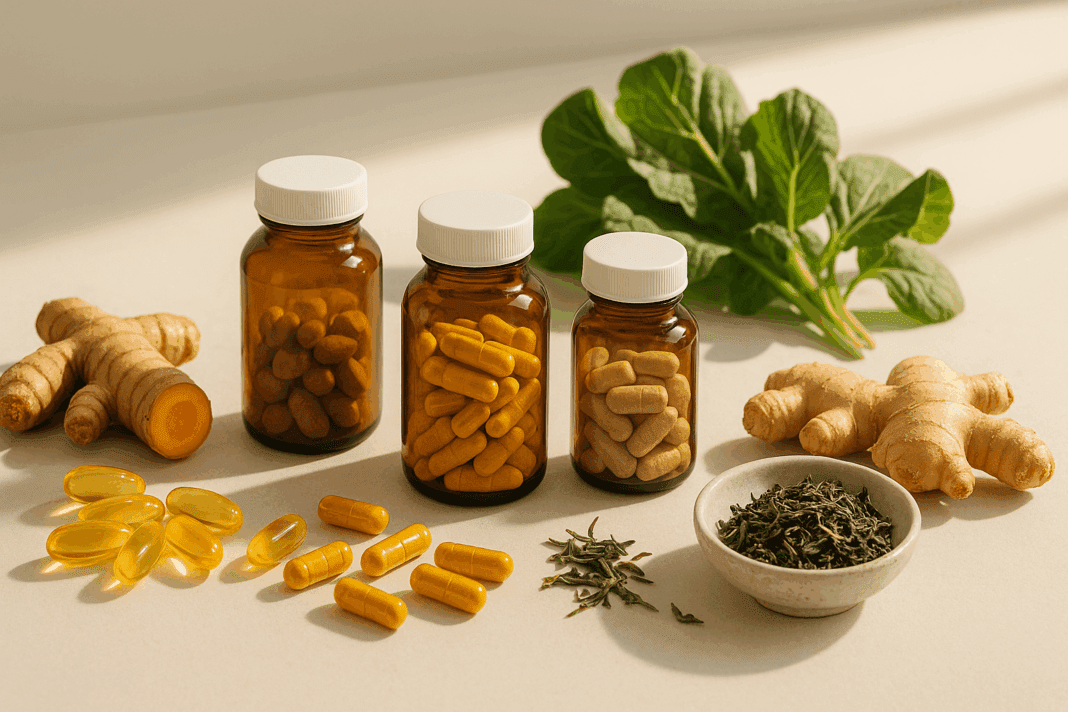Inflammation, often described as the body’s natural response to injury or infection, plays a complex role in both healing and chronic disease. While acute inflammation is essential for recovery, chronic inflammation can quietly undermine long-term health, contributing to conditions such as arthritis, cardiovascular disease, diabetes, and even neurodegenerative disorders. In recent years, growing attention has been given to the potential benefits of integrating an all in one anti inflammatory supplement into daily routines to combat persistent low-grade inflammation. With the global rise in health-conscious living and the popularity of holistic alternatives, this guide aims to provide comprehensive, evidence-based insights into selecting the most effective supplements that support inflammation control and overall wellness.
You may also like: The Ultimate Guide to Choosing an Effective Immune Support Supplement for Daily Wellness

Understanding Inflammation and Its Role in Health
To appreciate the value of inflammation-modulating supplements, one must first understand the biological basis of inflammation. In the short term, inflammation serves as a protective mechanism. When the body detects harmful stimuli such as pathogens, damaged cells, or irritants, the immune system responds by releasing chemicals that increase blood flow to the affected area, delivering immune cells that facilitate healing. Symptoms like redness, heat, swelling, and pain are common during this phase and indicate the body’s effort to restore balance.
However, when inflammation becomes chronic—persisting for weeks, months, or even years—it can trigger a cascade of health problems. Unlike acute inflammation, chronic inflammation is less visible but more insidious, gradually damaging tissues and organs. It has been strongly linked to diseases like rheumatoid arthritis, inflammatory bowel disease, psoriasis, asthma, and even certain cancers. This shift from beneficial to harmful makes managing inflammation a crucial priority for maintaining long-term health.

What Makes an All in One Anti Inflammatory Supplement Stand Out?
In the world of nutritional supplementation, consumers are often overwhelmed by the sheer volume of products available. The allure of an all in one anti inflammatory supplement lies in its ability to combine multiple bioactive ingredients—each targeting different inflammatory pathways—into a single, convenient formulation. Unlike single-ingredient supplements, all-in-one formulations aim to provide a synergistic blend of anti-inflammatory agents such as curcumin, omega-3 fatty acids, resveratrol, boswellia, and various antioxidant-rich herbs.
These supplements are often designed with bioavailability enhancers like black pepper extract (piperine) or liposomal delivery systems to improve absorption. The combination of targeted ingredients allows for multi-pronged action, addressing not just inflammation but also oxidative stress, immune regulation, and tissue repair. Such comprehensive coverage can be especially beneficial for individuals with complex inflammatory conditions or those seeking preventive care through daily wellness routines.

Key Ingredients Found in the Best Anti Inflammatory Supplements
A deeper dive into the formulation of the best anti inflammation supplements reveals a wide array of natural compounds with well-documented effects. Curcumin, the active component of turmeric, is among the most researched natural anti inflammatory supplements. It inhibits key inflammatory molecules such as NF-kB and cytokines while also acting as a potent antioxidant. However, curcumin’s poor natural absorption has led to the inclusion of piperine or nanoparticle formulations in many supplements.
Another cornerstone ingredient is omega-3 fatty acids, primarily found in fish oil. These essential fats reduce inflammation by decreasing the production of pro-inflammatory eicosanoids and cytokines. They are especially effective in managing joint pain, cardiovascular risk, and cognitive decline. Resveratrol, found in red grapes and berries, provides cardiovascular and anti-aging benefits through its antioxidant properties and ability to modulate inflammatory gene expression.
Boswellia serrata, an Ayurvedic herb, is widely recognized for its role in reducing joint pain and improving mobility. It works by inhibiting 5-lipoxygenase, an enzyme that contributes to the synthesis of inflammatory leukotrienes. Quercetin, ginger, green tea extract (EGCG), and bromelain are also commonly included for their complementary anti-inflammatory and antioxidant actions, making these blends highly effective as inflammation supplements.
How to Choose the Best Supplement for Inflammation and Pain Relief
Choosing the best supplement for inflammation requires careful evaluation of several factors beyond the ingredient list. Bioavailability, dosage, ingredient synergy, and third-party testing are critical considerations. Not all anti inflammatory supplements are created equal, and misleading marketing can often obscure true product quality.
Bioavailability is essential because even the most potent ingredients are ineffective if the body cannot absorb them. Look for formulations that use enhanced delivery technologies such as micellar, liposomal, or nanoemulsion formats. Check whether ingredients are present in their active or clinically supported forms. For example, “curcumin phytosome” is a more bioavailable version of curcumin that ensures better therapeutic outcomes.
Third-party testing and certifications offer another layer of trust. Reputable manufacturers often undergo independent testing to verify product purity, potency, and absence of contaminants such as heavy metals or microbial toxins. Consumer trust should also hinge on transparent labeling and the presence of clinically relevant dosages—not just token amounts for marketing appeal. Reviews, clinical studies, and practitioner recommendations further help in distinguishing the best inflammatory supplements from the mediocre.

The Role of Vitamins and Minerals in Anti Inflammatory Support
While herbs and botanical extracts dominate the conversation around anti swelling supplements, certain vitamins and minerals play equally vital roles. Among the best vitamins for inflammation, vitamin D stands out. Low levels of vitamin D have been associated with higher levels of inflammatory markers such as CRP (C-reactive protein). Supplementing with vitamin D3 may help reduce systemic inflammation, especially in individuals with autoimmune conditions or limited sun exposure.
Vitamin C, a powerful antioxidant, supports immune function and helps regenerate other antioxidants like vitamin E. It also participates in collagen synthesis, which is important for maintaining joint and connective tissue health. Similarly, vitamin E protects cell membranes from oxidative damage and may reduce inflammation in conditions like rheumatoid arthritis.
Magnesium, zinc, and selenium are trace minerals that support enzymatic processes involved in inflammation regulation. Magnesium, in particular, has been shown to reduce inflammatory markers and improve metabolic health. These vitamins good for inflammation often go unnoticed but are foundational in supporting the body’s natural anti-inflammatory mechanisms, making them indispensable in comprehensive supplement strategies.

How Natural Herbs for Inflammation Complement Modern Therapies
The growing interest in alternative medicine for inflammation has reignited a focus on plant-based solutions. Natural herbs for inflammation, long used in traditional systems like Ayurveda, Traditional Chinese Medicine (TCM), and Western herbalism, are now being validated by modern science. These herbs not only provide relief but also offer long-term benefits by modulating immune function and reducing oxidative stress.
For instance, ginger has shown comparable efficacy to NSAIDs in some clinical trials for managing osteoarthritis. It works by suppressing inflammatory prostaglandins and leukotrienes. Turmeric, as previously discussed, is another cornerstone of natural medicine for anti inflammatory support. Holy basil, cat’s claw, and devil’s claw are additional botanicals with promising research backing their use in inflammation management.
Importantly, these herbs often come with fewer side effects than synthetic medications. Their ability to work in harmony with the body’s innate processes makes them attractive as both standalone treatments and adjuncts to conventional therapy. By incorporating these natural supplements for inflammation, individuals can achieve a more balanced approach to wellness without relying solely on pharmaceuticals.
The Science Behind Supplements That Reduce Inflammation in the Body
Scientific validation is critical in distinguishing evidence-based supplements from unsubstantiated health claims. The best anti inflammatory supplements are backed by clinical trials, in-vitro studies, and epidemiological research that detail their mechanisms of action. Understanding these pathways allows consumers to make informed choices based on sound science.
For example, polyphenols like quercetin and EGCG inhibit the activity of enzymes such as cyclooxygenase (COX) and lipoxygenase (LOX), which are involved in inflammatory signaling. Omega-3 fatty acids reduce the expression of inflammatory genes and convert into specialized pro-resolving mediators (SPMs) that actively resolve inflammation. Curcumin, meanwhile, interferes with inflammatory transcription factors like NF-kB, reducing the production of cytokines and chemokines.
Moreover, research shows that multi-ingredient supplements may provide synergistic effects. When combined thoughtfully, these ingredients enhance one another’s absorption and efficacy. This makes a compelling case for the use of an all in one anti inflammatory supplement rather than isolated compounds, especially for those seeking holistic and sustained relief from chronic inflammation.
What Supplements Help with Inflammation from a Lifestyle Medicine Perspective
Lifestyle medicine emphasizes the integration of nutrition, physical activity, stress management, and supplementation in chronic disease prevention. From this perspective, what supplements help with inflammation must be contextualized within an individual’s broader health behaviors. Supplements are not panaceas, but they can be powerful adjuncts when combined with an anti-inflammatory diet rich in whole foods, fiber, and healthy fats.
Supplements good for inflammation often include those that support gut health, such as probiotics and prebiotic fibers. A healthy gut microbiome plays a pivotal role in immune regulation and inflammation control. Adaptogens like ashwagandha and rhodiola can help mitigate stress-related inflammation by balancing cortisol levels.
Additionally, sleep quality, exercise, and mental well-being significantly influence inflammatory status. Supplements like magnesium and melatonin support sleep, while branched-chain amino acids (BCAAs) and creatine assist in muscle recovery and injury prevention. By aligning supplement use with lifestyle strategies, individuals can optimize their anti-inflammatory efforts for lasting results.

Exploring the Benefits of Natural Anti Inflammatory Supplements
The shift toward natural anti inflammatory supplements reflects a broader movement toward clean, sustainable, and integrative healthcare. These supplements offer benefits that extend beyond inflammation reduction. Many contain antioxidants that neutralize free radicals, support mitochondrial health, and improve metabolic efficiency. Others enhance immune resilience and promote cellular repair.
For example, resveratrol not only reduces inflammation but also activates sirtuins—proteins associated with longevity. Astaxanthin, a marine carotenoid, supports skin, eye, and brain health while combating oxidative stress. Spirulina, chlorella, and other algae-based supplements are rich in anti-inflammatory pigments, amino acids, and micronutrients.
Consumers are increasingly seeking transparency in sourcing, manufacturing practices, and sustainability. Ethical brands now emphasize organic farming, non-GMO ingredients, and recyclable packaging. As awareness of environmental and personal health grows, the demand for high-quality natural supplements for inflammation continues to rise, reinforcing their role in everyday wellness.
Why an All in One Anti Inflammatory Supplement May Be the Smartest Daily Choice
Convenience and efficacy often dictate consumer choices, and few options offer the comprehensive benefits of an all in one anti inflammatory supplement. Instead of juggling multiple pills, powders, or tinctures, individuals can access a curated formula that delivers synergistic, clinically validated ingredients in one daily dose. This not only improves compliance but also ensures balanced nutrient intake without over-supplementation.
Moreover, the formulation of these supplements is often based on rigorous research into ingredient interactions. For instance, combining quercetin with bromelain enhances absorption, while including black pepper extract improves curcumin efficacy. These combinations maximize therapeutic impact while minimizing redundancy.
As healthcare systems shift toward prevention and personalized wellness, such supplements represent an effective bridge between traditional medicine and integrative health practices. When chosen with care, an all in one anti inflammatory supplement can serve as a cornerstone of a well-rounded daily wellness strategy, empowering individuals to take proactive control over inflammation and its broader health implications.
What Vitamins Help with Inflammation and How to Use Them Safely
Despite their ubiquity, vitamins are often misunderstood in the context of inflammation. What vitamins help with inflammation depends on individual deficiencies, health status, and lifestyle factors. Vitamins that decrease inflammation often include fat-soluble compounds like vitamin D and E, as well as water-soluble antioxidants such as vitamin C and certain B vitamins.
Vitamin B6 and B12, for example, play essential roles in homocysteine metabolism, an amino acid linked to inflammation when elevated. Folate works synergistically with these vitamins to regulate methylation pathways, which are crucial for DNA repair and immune function. Supplementing with these vitamins requires appropriate dosing, ideally guided by laboratory testing or healthcare provider recommendations.
While supplementation can be beneficial, more is not always better. Fat-soluble vitamins can accumulate in the body and may cause toxicity if overused. Always opt for professional-grade formulations with clearly labeled dosages, and consider periodic testing to monitor levels. Integrating vitamin-rich whole foods alongside targeted supplementation can enhance both safety and effectiveness.
Frequently Asked Questions About Anti Inflammatory Supplements and Daily Wellness
What Makes an All in One Anti Inflammatory Supplement More Effective Than Taking Individual Ingredients Separately?
An all in one anti inflammatory supplement is specifically formulated to offer a balanced combination of ingredients that work synergistically. While taking individual anti inflammatory supplements can be beneficial, combining them into a single formulation ensures that dosages are optimized for absorption and efficacy. For instance, curcumin is more bioavailable when paired with piperine, which enhances its absorption by up to 2,000%. A standalone approach may miss such crucial pairings. Moreover, a comprehensive supplement also reduces the burden of managing multiple products, improves consistency in dosing, and minimizes the risk of nutrient interactions or overdosing—making it both practical and scientifically advantageous for long-term use.
Are There Lifestyle Factors That Can Enhance the Effectiveness of Anti Inflammatory Supplements?
Yes, lifestyle habits significantly influence the effectiveness of supplements that reduce inflammation. A diet rich in whole, unprocessed foods—especially those containing polyphenols and omega-3 fatty acids—can work in concert with natural anti inflammatory supplements. Regular physical activity improves circulation and metabolic function, which supports nutrient delivery and absorption. Stress reduction practices such as meditation and adequate sleep further optimize the body’s inflammatory response. In contrast, poor sleep, chronic stress, and excessive alcohol or sugar intake can counteract the effects of even the best anti inflammation supplements. Pairing supplements with a holistic health strategy maximizes their potential benefits.
Can an All in One Anti Inflammatory Supplement Replace Prescription Medications for Chronic Conditions?
While an all in one anti inflammatory supplement can provide significant support for managing chronic inflammation, it should not be considered a substitute for prescription medication without guidance from a healthcare provider. Supplements are categorized as complementary or alternative medicine for inflammation and are most effective when used in conjunction with medical treatment. For individuals with autoimmune diseases or severe inflammatory disorders, medications may be necessary to control acute flares. However, long-term use of anti swelling supplements may help reduce reliance on medications, minimize side effects, and improve quality of life—especially under professional supervision and with regular monitoring.
What Vitamins Reduce Inflammation and How Do They Work in the Body?
Several vitamins play key roles in regulating the body’s inflammatory pathways. Vitamin D modulates the immune system and has been linked to reduced levels of C-reactive protein, a marker of systemic inflammation. Vitamin C neutralizes free radicals and assists in the regeneration of other antioxidants, making it one of the top vitamins good for inflammation. Vitamin E protects cellular membranes from oxidative damage and supports tissue repair. B vitamins such as B6 and B12 are vital for methylation processes that control gene expression related to inflammation. Collectively, these vitamins that decrease inflammation help restore immune balance and enhance tissue resilience.
How Do Natural Herbs for Inflammation Compare to Conventional Anti-Inflammatory Drugs?
Natural herbs for inflammation often act more gradually than conventional drugs but are associated with fewer side effects. For example, boswellia and ginger have shown anti-inflammatory effects similar to NSAIDs but without the gastrointestinal complications. These herbs are considered part of natural medicine for anti inflammatory support and work by modulating enzymes like COX and LOX rather than completely blocking them. While pharmaceuticals tend to target a single pathway, herbs often affect multiple biological systems. The best herb for inflammation typically offers added benefits such as antioxidant protection, joint support, and improved mobility, making them a valuable complement to traditional therapies.
What Supplements Help With Inflammation for People With Autoimmune Conditions?
Individuals with autoimmune conditions often benefit from supplements that target both inflammation and immune dysregulation. Omega-3 fatty acids, turmeric, and resveratrol are among the most effective natural supplements for inflammation in this population. These compounds help suppress overactive immune responses without impairing overall immunity. Probiotics also show promise in rebalancing gut microbiota, which plays a central role in immune signaling. When selecting inflammation supplements, it’s essential to choose products that have been third-party tested for purity and formulated with therapeutic dosages. Such supplements to reduce inflammation in the body should always be used alongside medical treatments and under professional guidance.
How Do Anti Inflammatory Supplements Support Recovery After Exercise or Injury?
Anti inflammatory supplements play a vital role in recovery by reducing muscle soreness, improving tissue repair, and limiting oxidative stress. For athletes or those engaging in regular physical activity, supplements that reduce inflammation such as curcumin, bromelain, and omega-3s can help shorten recovery time. These supplements work by decreasing the production of pro-inflammatory cytokines and supporting collagen synthesis. Including an anti inflammation supplement in a post-exercise routine can enhance performance longevity, reduce injury risk, and promote joint flexibility. Over time, this approach contributes to better resilience and long-term musculoskeletal health.
Why Are All in One Anti Inflammatory Supplements Gaining Popularity in Holistic Health Circles?
All in one anti inflammatory supplements are increasingly favored in holistic health due to their convenience, comprehensiveness, and integrative design. Rather than managing multiple bottles and dosages, users can take a single supplement that addresses multiple pathways of inflammation. These products often include both botanical and nutritional elements, representing a fusion of Western nutritional science and alternative medicine for inflammation. The inclusion of adaptogens, antioxidants, and essential micronutrients allows for broad-spectrum support. This makes them especially appealing for health-conscious consumers who value natural, evidence-based approaches to daily wellness.
What Are the Emerging Trends in Anti Inflammatory Supplement Formulation?
The supplement industry is evolving rapidly, with new delivery technologies and ingredients reshaping how anti inflammatory supplements are formulated. Liposomal and micellar delivery systems are improving bioavailability of poorly absorbed nutrients like curcumin. Novel ingredients such as PEA (palmitoylethanolamide) and SPMs (specialized pro-resolving mediators) are being explored for their targeted effects on inflammation resolution rather than suppression. The market for the best supplements for inflammation and pain is also expanding to include AI-personalized supplement blends tailored to genetic and lifestyle profiles. These innovations aim to improve efficacy, compliance, and personalization in inflammation management.
Can Anti Swelling Supplements Be Used Long-Term, and Are There Any Risks?
Most high-quality anti swelling supplements can be safely used long-term when taken at recommended dosages. Ingredients like turmeric, ginger, and omega-3s have extensive safety records and may even provide cumulative benefits over time. However, some compounds, particularly those that influence blood clotting or interact with medications, should be used cautiously. For instance, excessive use of fish oil or curcumin may potentiate bleeding risk, especially before surgery. It’s important to rotate supplements periodically, monitor nutrient levels through blood work, and consult a healthcare provider. Integrating supplements good for inflammation into a broader strategy that includes nutrient-rich food, stress management, and physical activity can mitigate any potential risks while promoting long-term health.
Conclusion: Empowering Daily Wellness with the Best Anti Inflammation Supplements
Chronic inflammation is increasingly recognized as a root contributor to a wide array of modern health challenges, from autoimmune conditions to cognitive decline. As research deepens our understanding of its mechanisms, the role of targeted, natural, and synergistic supplementation becomes clearer and more vital. An all in one anti inflammatory supplement, especially when thoughtfully formulated and responsibly sourced, offers a powerful, convenient, and holistic solution for individuals seeking to reduce inflammation and support daily wellness.
Whether you are navigating an inflammatory health condition, looking to enhance recovery from exercise, or simply striving for optimal health, these supplements can provide meaningful support. They are not a replacement for healthy living but rather a vital complement to it—anchoring an integrative approach that prioritizes prevention, resilience, and vitality. As science continues to affirm the link between inflammation and chronic disease, choosing the right supplement becomes not just a matter of convenience but a proactive step toward long-term well-being.
Further Reading:
9 Best Supplements to Fight Inflammation
25 Best Supplements for Inflammation: Your Ultimate Guide for 2024
Supplements for Inflammation 101: These Nutrients Reduce Inflammation



